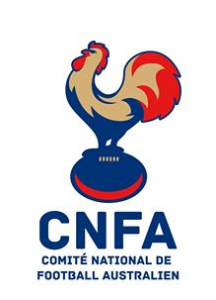In this 5th installment of the series on International Footy we sit down with Thomas Urban and Alban Schieber, the President and Communications Director for the Comite Nationale de Football Australien.
Australian Football came to France during the first world war 1, being played by Australian soldiers near Villers Bretonneux, but it wasnt until 2005 that the first club was formed in Strasburg (Paris being primarily an expatriate Australian club). Today there are nine clubs in France, with seven clubs in the main competition the CNFA. There are also three womens sides.
Last season there was two divisions, including development sides, but for this season all sides were merged into the one main competition.
There are approximately 200 Australian Football players in France with about 5% – Alban says 10-12 players at most – being expatriate Australians, and most of those are based with the Paris club. Recently, a club made up entirely French players won the league, after years of being dominated by Paris. Alban believes this is a great sign for the health of the game in France.
The league consists of 6 rounds, semi finals and a final. With 3 rounds played in the autumn, and three rounds and finals played in the spring. Alban says that no one wants to play in the cold and snow during the winter. In addition clubs play friendlies against each others.
Games are played primarily on rugby and soccer grounds – cricket ovals are practically non existent in France. The league plays 9 a side football with the same rules that apply to the 18 a side game.
Periodically test matches are played against other countries, and some French teams close to the border play friendlies against German sides.
Thomas Urban is the President of the league, National Coach, Umpire – and a West Coast supporter- and has been involved in the game for about 5 years. He says he got involved due to his fascination with Australian culture, and passion for sport. This lead him to be one of the founders of the Toulouse club and he’s been involved ever since.
Alban Schieber is the Communications manager for the league – and follows the Adelaide Crows – and his story is quite fascinating. He was an exchange student in Mt Gambier, South Australia in 2006 who wanted to play Rugby Union, but learnt that no one played Rugby Union in Mt Gambier. Fellow students took him along to training and despite speaking no english – and having a penchant for tackling below the knees – he soon found himself playing on debut for West Gambier against his club North Gambier due to a numbers shortage where he says he gave away a number of free kicks for low tackling to his training mates. He was soon playing regular for footy for Norths.
Upon his return to France, Schieber returned to playing rugby as he couldnt find any Australians to play with until almost three years later when a team was founded at Bordeaux. He’s been involved ever since, including a year with the Finland AFL.
The CFNA speaks highly of AFL Europe as a governing body, primarily for its promotion. The league also benefits from french government assistance by being a member of a sports federation which gives them access to some funding and grants.
A major fillip for the CFNA occured in 2013 when Bordeaux hosted the Axios EU Cup, featuring 12 different national mens teams, and 2 womens. They received local government support including free ground use. 26 games were played featuring 2 halves of 15 minutes, with the grand final featuring 2 halves of 20 minutes. (Note: World Footy News has a big article on this here)
The Grand Final was attended by two thousand people. Schieber says that 1,500 of these were not involved in Australian football in any way.
The French did well, playing in the Grand final for the first time against England. Thomas is pleased with the result given they beat the European champions, Ireland, by a point during the preliminary rounds, and defeated Italy in the semi final.
The International Cup has been a mixed bag for the French side. They have won 3 and lost 3 at the Cup, and in their first match they faced the previous winner in Papua New Guinea, as well as Tonga.
Their second Cup was better, having been allocated to a division more within their abilities, where they made their division final, losing to Fiji.
Like many international sides, the French face the same difficulties in financing their trip to Melbourne in August, although they plan on attending however the three thousand euro cost per player is difficult to raise when many of the French players are students.
If you want to be involved in Australian Football in France, you can find all the relative information in english on the AFL Europe site. If you speak French you can find further information at http://www.football-australien.fr/
You can hear the interview here or on youtube. You can also join the discussion here.



